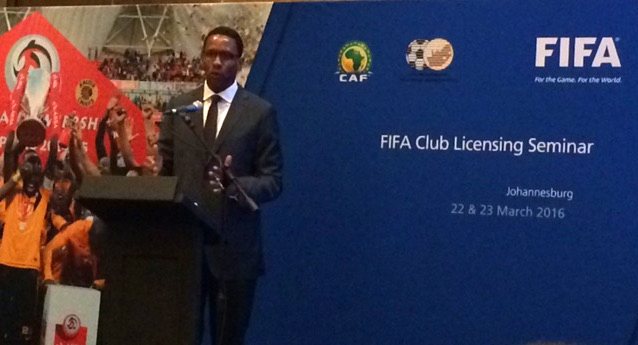Former Trinidad & Tobago international Shaka Hislop has been a key speaker at the FIFA Club Licensing Seminar for the COSAFA region held in Johannesburg.
The seminar is to present FIFA and CAF’s vision of what the future requirements for clubs will be in terms standardised norms across all football around the world.
Key areas are administration, finances, legal, sporting criteria and infrastructure.
Hislop tells COSAFA.com that he has been impressed with the dialogue so far and believes the programme will benefit clubs across the continent.
COSAFA.com: The FIFA Club Licensing Programme looks at a number of areas, but one of those being academies. Is it achievable for all clubs across the world to have thriving academies?
Shaka Hislop: It’s vital for the long-term future of the clubs. As an example, I spoke recently with Sir Alex Ferguson and he said when he came into Manchester United, he told his board they must make the club’s academy the foundation for their growth and success, and some 26 years later we all know how successful that was.
It affords the players the opportunity to play at the highest level that their talent will take them. It also serves the clubs better in terms of their bottom line. Case studies have shown that clubs with good academies have a better bottom line.
I contrast the two Manchester clubs and their current approaches. As much as Manchester City have spent heavily [on players] in recent times, that hasn’t really been matched by the success they would like. They have also started now spending on their academy and that will start to come to fruition in time.
Manchester United are going through a lean spell now but I don’t think anybody will doubt they will bounce back based on how big a brand they are. But that brand was built on a strong academy and bringing through youth with a strong development programme and scouting network.
Is it possible to apply the same rules to football clubs in, say, CONCACAF and CAF, as it is in UEFA, given the different challenges faced by clubs around the world?
It’s attainable, the FIFA guidelines are not meant as a one-solution fits all approach, they are meant as guidelines. The demands will be finalised by the individual confederations. You are right, as much as there are similarities between CONCACAF and CAF in a number of ways, we have our own issues and unique football philosophies, and those needs to be respected.
FIFA offers a broad oversight of what they would like, but the ultimate outcomes are being finalised on a regional basis.
Have you been impressed with how things have gone in the CAF region so far?
There has been a ‘soft’ launch in a few countries, including in South Africa. It is about getting people used to what is required of them. There are no penalties or harsh repercussions yet, it’s about showing people how to get in line without the big down-side at this stage.
What is your feeling after the opening day of the seminar in Johannesburg?
There has been a very healthy turnout. With this seminar, the discourse between those presenting and the general secretaries [from the various CAF associations] that are here has been great. There have been very good questions. There is a good understanding about what FIFA wants to put and place and what is actually achievable on the ground in Africa.
It’s not been a one-way conversation of ‘me telling you what to do’, it has gone both ways and been very informative for both sides.

